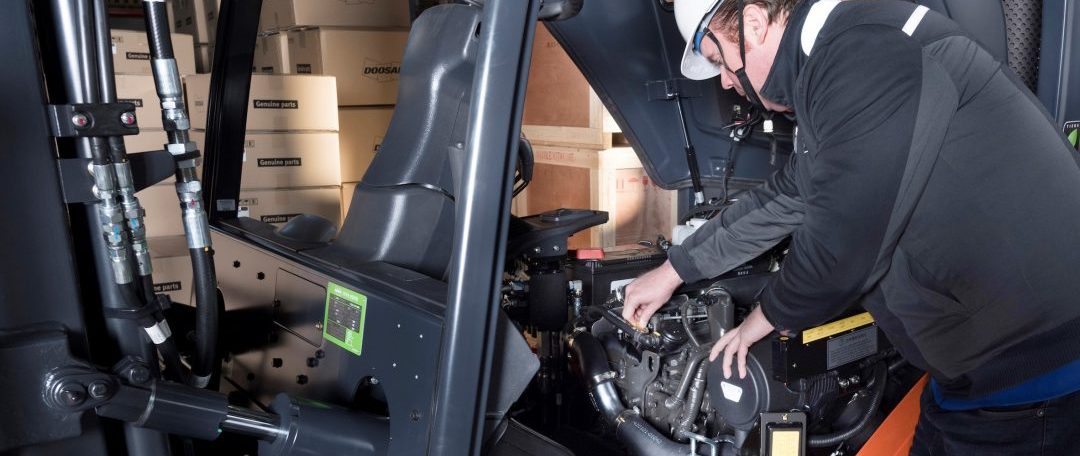A pallet truck is defined as a wheeled trolley that is engineered to both lift and move pallets. The built-for-purpose material handling solutions have tapered forks that are specially designed to be able to slot underneath a pallet. Pallet trucks also have pump handles that can be employed to both raise and lower a load. A common sight in industrial environments like factory floors and warehouses across the country, pallet trucks are available in an extensive range of different styles. These include conventional solutions such as manual pallet trucks but also high-lift pallet trucks, and innovative electric pallet trucks that put less physical strain on operators. As with the rest of your fleet, it is essential that you think about pallet truck servicing and how to keep these in the best working order.
Pallet trucks are a reliable workhorse for many operations throughout the UK, but to get maximum performance and extended active service life from them, they must be always well maintained and effectively serviced. In this blog, we’ll answer some commonly asked questions regarding pallet truck servicing, including whether they are covered by the Lifting Operations and Lifting Equipment Regulations’ also known by the acronym LOLER for short.
What is LOLER?
The Lifting Operations and Lifting Equipment Regulations (LOLER) act was established in 1998. A set of official regulations they were determined by the UK’s Health & Safety Executive (HSE), placing specific standards and duties on individuals and enterprises who own, use or exercise control over any type of lifting equipment. Additionally, the regulations apply to all organisations and businesses whose staff use lifting equipment, regardless of whether it is owned by them. As per LOLER, all lifting equipment in use must be fit for purpose and suitable for the type of work that it is being applied to. As such it must be thoroughly examined by a qualified engineer.
Are pallet trucks covered by LOLER?
Excluding high-lift pallet trucks, most forms of pallet trucks available to buy and use on the current market do not fall within LOLER regulations. The reason for this is that generally, LOLER covers equipment that experiences a higher “consequence” should its load happen to fall. As pallet trucks are only lifting pallets just a little way off the ground to help improve mobility, the associated risk level is deemed to be exceptionally low. As a result, standard pallet trucks do not come under LOLER.
High-lift pallet trucks might sound similar however the key difference is that these material handling solutions are designed to lift loads substantially higher. As a result, the potential consequences of a falling load are considerably greater and therefore they are covered by LOLER and must have an appropriate inspection.
What regulations must be considered when using pallet trucks?
Just because pallet trucks are not covered by LOLER does not mean that due care should not be taken when using, maintaining, and servicing them, or that employees can’t injure themselves whilst operating them. Best practices dictate that common sense and general care should always be adopted when lifting equipment is used, particularly in busy industrial environments such as warehouses and factories.
While pallet trucks are not covered by LOLER they do come undercome under the ‘Provision and Use of Work Equipment regulations’ act of 1998, also known as PUWER for short. These HSE regulations are designed to encompass almost all types of machinery that are employed in workplaces every day.
PUWER once demanded that pallet trucks required an annual service but as of January 1, 2021, this rule was replaced with a system based on risk assessment. Fundamentally, the assessment is still designed to confirm that safe use of the pallet truck entails regular service and if necessary, repairs in line with recommendations from the manufacturer.
So, while the relatively low injury risk and low possibility of items falling from pallet trucks mean they are not subject to LOLER they must still meet PUWER.
What is the difference between regular pallet truck maintenance and servicing?
Finally, to operate at optimum performance and remain in good working order, regular pallet truck maintenance is essential. This involves a daily inspection of equipment before use which is conducted visually but also practically. Checks to ensure that pallet forks are straight and not damaged are important but also tests on whether pumping mechanisms and wheel mobility are functioning correctly. The same checks should be carried out after use and if any issues are identified these should be remedied before the trucks return to service. This routine maintenance can be conducted by a competent professional on-site.
Pallet truck servicing is a more in-depth examination and must be carried out by an experienced and qualified professional. Engineers may take equipment offsite for testing or send a mobile unit to carry out the service. Pallet trucks will be put through their paces and fully tested to make sure that they are still operating effectively. After passing its service, documentation will be issued as proof that the equipment owner is operating within the HSE’s regulations.
For more on how we can help with pallet truck servicing for your fleet, contact our team today.

